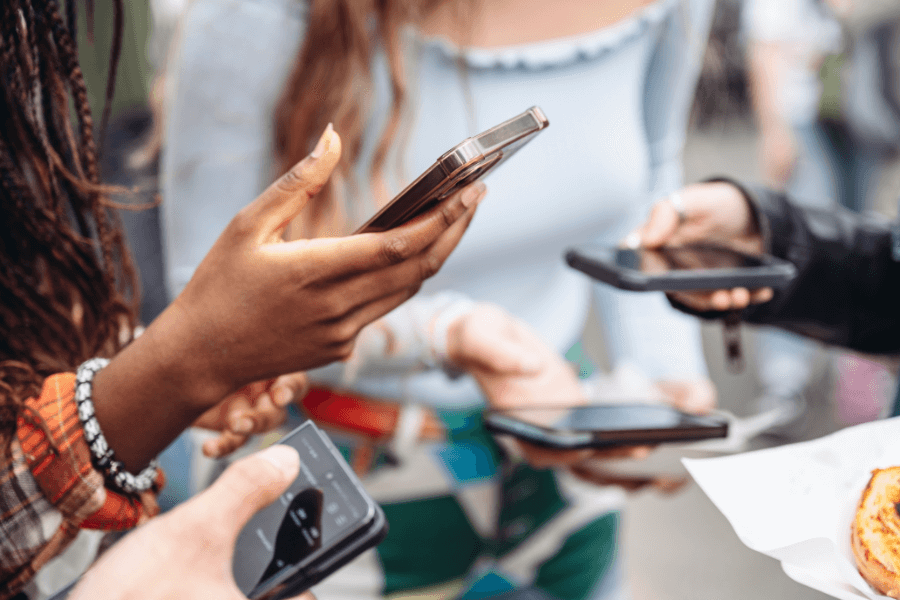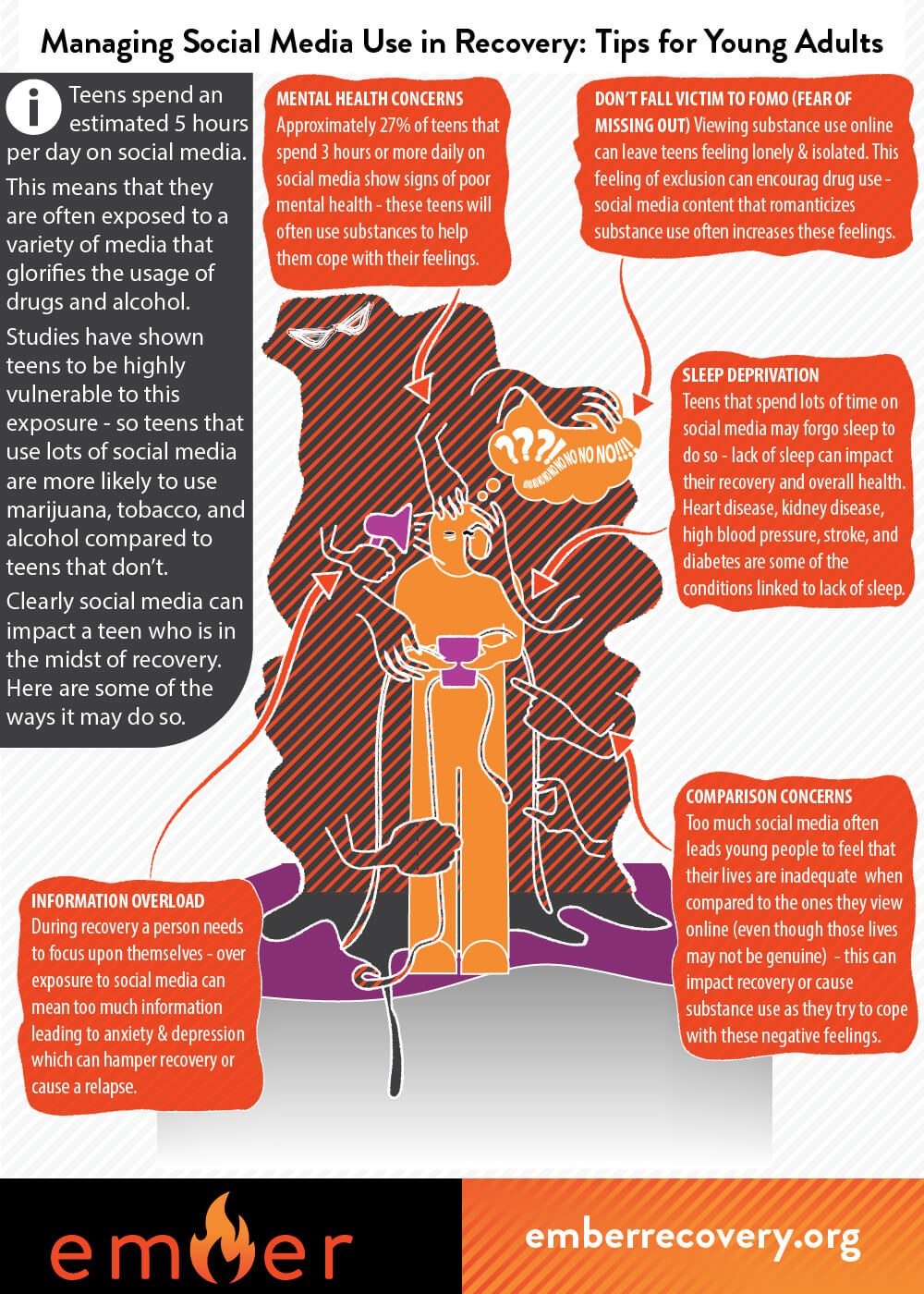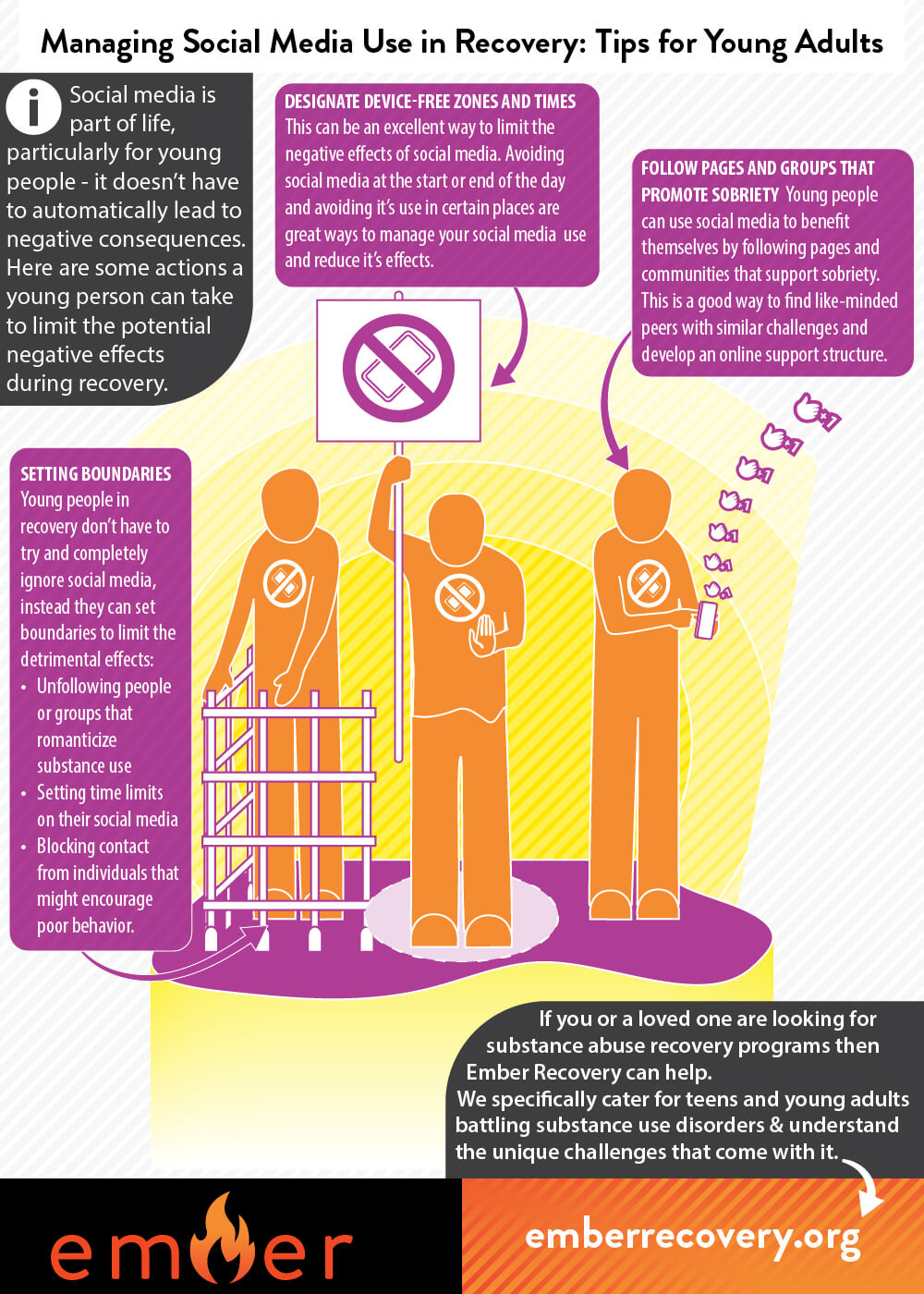It’s estimated that teens spend an average of five hours daily on social media.[1] During this time, they are bombarded with a variety of images portraying drugs and alcohol, with many instances glorifying their usage. For teens and young adults, this can damage the recovery process. We will explore the pitfalls to avoid when it comes to social media and recovery and share tips on how to successfully manage social media use during this fragile time.
Social Media and Recovery: Pitfalls to Avoid
Studies have shown that teens can be highly vulnerable to the images they see on social media, leading them to revert to their old habits. Researchers found that teens who use social media are more apt to use marijuana, tobacco, and alcohol compared to teens who are not on social media platforms.[2] Here are some pitfalls to avoid when it comes to social media use during recovery:
Don’t Fall Victim to FOMO (fear of missing out)
When young people see others being social and using substances online, they may start to feel lonely and isolated. This may cause them to feel as though they are missing out, which can tempt them to go back to using substances. Social media platforms can also romanticize substance use for those in recovery, making it difficult for them to resist the temptation they are feeling.[3]
Mental Health Concerns
Too much exposure to social media can lead to mental health problems, which can then cause substance use. Research shows that about 27% of children who spend 3 or more hours a day on social media show signs of poor mental health.[2] When teens are facing mental health issues, they may often turn to substance use to help them manage their feelings.[4]
Information Overload
During recovery, the focus should be on the recovery process. When too much time is spent on social media, young people may begin to get too much information at once. This can cause anxiety and can lead to depression.
Sleep Deprivation
When people are spending a lot of time on social media, they may stay up late, depriving their bodies of the sleep they need. This may impact not only their recovery but also their overall health. Sleep deprivation has been linked to heart disease, kidney disease, high blood pressure, stroke, and diabetes.[5]
Comparison Concerns
Too much social media use and exposure can cause young people to compare themselves and their lives to others. They may begin to feel as though they are not good enough and that they don’t measure up to what they see on social media. These feelings of inadequacy can lead to relapse as young adults look to substances to mask their pain. They may not realize that many people exaggerate their posts, and things may not seem as great as they appear. Anyone can post anything on social media, but no one knows what is happening behind closed doors.
How to Manage Social Media Use During Recovery
Set Boundaries
Young people don’t have to eliminate social media from their lives during recovery if they can find ways to set boundaries. This may mean unfollowing certain groups or people or setting a time limit to how much daily exposure they will have. Young people can also control who can contact them to prevent people from tempting them to use drugs and alcohol.
Designate Device-Free Zones and Times
An excellent way to manage social media during recovery is to designate device-free zones and times. Ignoring social media at night or first thing in the morning can be a way to limit exposure. You can also decide you won’t use specific devices at various locations. These are all ways to decrease the amount of time on social media and the impact it can have.
Follow Pages and Groups That Promote Sobriety
Another way to manage social media during recovery is to use it to your benefit. Follow pages and groups that promote sobriety. Young people can follow these pages and groups and join online recovery communities. These are great ways to find like-minded peers facing the same battles as you use social media time for beneficial activities.
Are You Looking for a Substance Abuse Recovery Program? Ember Recovery is Here to Help
If you or a loved one is looking for substance abuse recovery programs for youth in Iowa, Ember Recovery is here to help. We specifically cater to the needs of teens and young adults who are battling substance use disorders because we understand the difficulties they face on their recovery journey. Contact us today to learn more about our programs and how they have helped thousands of young people live the sober life they deserve.
Sources:
[1] https://www.apa.org/monitor/2024/04/teen-social-use-mental-health [2] https://www.jahonline.org/article/S1054-139X(17)30158-1/pdf [3] https://www.cbsnews.com/news/survey-digital-peer-pressure-fueling-drug-alcohol-use-in-high-school-students/ [4] https://childmind.org/article/mental-health-disorders-and-substance-use/ [5] https://www.nhlbi.nih.gov/health/sleep-deprivation
Andrea Dickerson is a Licensed Therapist and Certified Substance Use Counselor who has worked in behavioral health since 1997. Currently, Andrea is the Director of Behavioral Health, overseeing the Ember residential treatment programs and YSS outpatient counseling clinics throughout Central and North Central Iowa. She became a Motivational Interviewing (MI) trainer in 2006 and provides MI trainings throughout Iowa.
Andrea specializes in working with adolescents and their families and enjoys seeing the family relationships grow through therapy. Andrea is also a CARF International Surveyor, going around North America ensuring behavioral health organizations are meeting required standards.
In her free time, Andrea enjoys cheering on the Iowa Hawkeyes and Chicago Cubs, as well as being an active member of Soroptimist International of the Americas (SIA), a global organization that provides women and girls with access to the education and training they need to achieve economic empowerment. She has been a member of the SI of Des Moines club since 2012 and has been actively involved at the regional level, currently serving as Co-Governor of the Peaks to Plains Region.
Through her involvement in SIA, Andrea has been actively involved in the Dream Programs, coordinating annual Dream It, Be It: Career Support for Girls projects, which give girls the tools they need to achieve their education and career goals, empowering them to break cycles of poverty, violence, and abuse.


